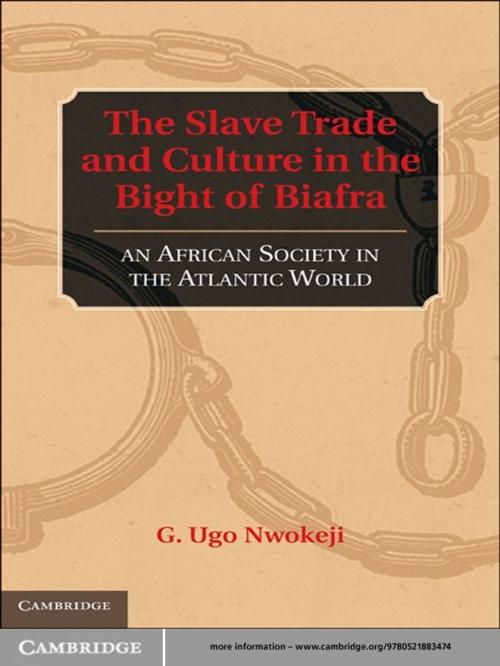The Slave Trade and Culture in the Bight of Biafra
An African Society in the Atlantic World
Nonfiction, History, Africa, World History| Author: | G. Ugo Nwokeji | ISBN: | 9780511852312 |
| Publisher: | Cambridge University Press | Publication: | September 13, 2010 |
| Imprint: | Cambridge University Press | Language: | English |
| Author: | G. Ugo Nwokeji |
| ISBN: | 9780511852312 |
| Publisher: | Cambridge University Press |
| Publication: | September 13, 2010 |
| Imprint: | Cambridge University Press |
| Language: | English |
The Slave Trade and Culture in the Bight of Biafra dissects and explains the structure, dramatic expansion, and manifold effects of the slave trade in the Bight of Biafra. By showing that the rise of the Aro merchant group was the key factor in trade expansion, G. Ugo Nwokeji reinterprets why and how such large-scale commerce developed in the absence of large-scale centralized states. The result is the first study to link the structure and trajectory of the slave trade in a major exporting region to the expansion of a specific African merchant group - among other fresh insights into Atlantic Africa's involvement in the trade - and the most comprehensive treatment of Atlantic slave trade in the Bight of Biafra. The fundamental role of culture in the organization of trade is highlighted, transcending the usual economic explanations in a way that complicates traditional generalizations about work, domestic slavery, and gender in pre-colonial Africa.
The Slave Trade and Culture in the Bight of Biafra dissects and explains the structure, dramatic expansion, and manifold effects of the slave trade in the Bight of Biafra. By showing that the rise of the Aro merchant group was the key factor in trade expansion, G. Ugo Nwokeji reinterprets why and how such large-scale commerce developed in the absence of large-scale centralized states. The result is the first study to link the structure and trajectory of the slave trade in a major exporting region to the expansion of a specific African merchant group - among other fresh insights into Atlantic Africa's involvement in the trade - and the most comprehensive treatment of Atlantic slave trade in the Bight of Biafra. The fundamental role of culture in the organization of trade is highlighted, transcending the usual economic explanations in a way that complicates traditional generalizations about work, domestic slavery, and gender in pre-colonial Africa.















